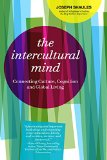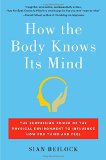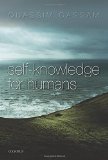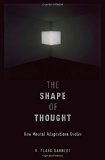January 12, 2015

The Intercultural Mind: Connecting Culture, Cognition, and Global Living by Joseph Shaules (Intercultural Press, 2015)
(amazon.co.uk)
Book description from the publisher:
In this pioneering book, Joseph Shaules explores exciting new research in cultural psychology and neuroscience, and explains how the new science of the mind can help us understand how the unconscious mind processes cultural differences, and how our sense of identity shapes how we view the world.
The Intercultural Mind presents new perspectives on important questions such as:
What is culture shock, and how does it affect us?
Why are we blind to our own cultural conditioning?
Can cultural differences be measured?
What does it mean to have an international mindset?
Illustrated with a wealth of examples and memorable stories, The Intercultural Mind is a fascinating look at how intercultural experiences can transform the geography of thinking.
Comments (0)
- culture,new books
January 8, 2015

How the Body Knows Its Mind: The Surprising Power of the Physical Environment to Influence How You Think and Feel by Sian Beilock (Atria Books, 2015)
(kindle ed.), (amazon.co.uk)
Book description from the publisher:
An award-winning scientist offers a groundbreaking new understanding of the mind-body connection and its profound impact on everything from advertising to romance.
The human body is not just a passive device carrying out messages sent by the brain, but rather an integral part of how we think and make decisions. In her groundbreaking new book, Sian Beilock, author of the highly acclaimed Choke, which Time magazine praised for its “smart tips…in order to think clearly…and be cool under pressure,” draws on her own cutting-edge research to turn the conventional understanding of the mind upside down in ways that will revolutionize how we live our lives.
At the heart of How the Body Knows Its Mind is the tantalizing idea that our bodies “hack” our brains. The way we move affects our thoughts, our decisions, and even our preferences for particular products. Called “embodied cognition,” this new science—of which Beilock is a foremost researcher—illuminates the power of the body and its physical surroundings to shape how we think, feel, and behave. Beilock’s findings are as varied as they are surprising. For example, pacing around the room can enhance creativity; gesturing during a speech can help ensure that you don’t draw a blank; kids learn better when their bodies are part of the learning process; walking in nature boosts concentration skills; Botox users experience less depression; and much more. From the tricks used by advertisers to the ways body language can improve your memory, Beilock explains a wealth of fascinating interconnections between mind and body and how mastering them can make us happier, safer, and more successful.
Google Books preview:
See also: Author’s website
Comments (0)
- cognitive science,new books
January 6, 2015

The Soul Fallacy: What Science Shows We Gain from Letting Go of Our Soul Beliefs by Julien Musolino (Prometheus Books, 2015)
(kindle ed.), (amazon.co.uk)
Book description from the publisher:
Most Americans believe they possess an immaterial soul that will survive the death of the body. In sharp contrast, the current scientific consensus rejects the traditional soul, although this conclusion is rarely discussed publicly. In this book, a cognitive scientist breaks the taboo and explains why modern science leads to this controversial conclusion. In doing so, the book reveals the truly astonishing scope and power of scientific inquiry, drawing on ideas from biology, psychology, neuroscience, philosophy, and the physical sciences.
Much more than chronicling the demise of the traditional soul, the book explores where soul beliefs come from, why they are so widespread culturally and historically, how cognitive science offers a naturalistic alternative to religious conceptions of mind, and how postulating the existence of a soul amounts to making a scientific claim.
Although the new scientific view of personhood departs radically from traditional religious conceptions, the author shows that a coherent, meaningful, and sensitive appreciation of what it means to be human remains intact. He argues that we do not lose anything by letting go of our soul beliefs and that we even have something to gain.
Throughout, the book takes a passionate stand for science and reason. It also offers a timely rejoinder to recent claims that science supports the existence of the soul and the afterlife.
Google Books preview:
Author interview:
Comments (0)
- new books,self
January 4, 2015

Self-Knowledge for Humans by Quassim Cassam (Oxford University Press, 2014)
(kindle ed.), (amazon.co.uk), (UK kindle ed.)
Book description from the publisher:
Human beings are not model epistemic citizens. Our reasoning can be careless and uncritical, and our beliefs, desires, and other attitudes aren’t always as they ought rationally to be. Our beliefs can be eccentric, our desires irrational and our hopes hopelessly unrealistic. Our attitudes are influenced by a wide range of non-epistemic or non-rational factors, including our character, our emotions and powerful unconscious biases. Yet we are rarely conscious of such influences. Self-ignorance is not something to which human beings are immune.
In this book Quassim Cassam develops an account of self-knowledge which tries to do justice to these and other respects in which humans aren’t model epistemic citizens. He rejects rationalist and other mainstream philosophical accounts of self-knowledge on the grounds that, in more than one sense, they aren’t accounts of self-knowledge for humans. Instead he defends the view that inferences from behavioural and psychological evidence are a basic source of human self-knowledge. On this account, self-knowledge is a genuine cognitive achievement and self-ignorance is almost always on the cards.
As well as explaining knowledge of our own states of mind, Cassam also accounts for what he calls ‘substantial’ self-knowledge, including knowledge of our values, emotions, and character. He criticizes philosophical accounts of self-knowledge for neglecting substantial self-knowledge, and concludes with a discussion of the value of self-knowledge.
This book tries to do for philosophy what behavioural economics tries to do for economics. Just as behavioural economics is the economics of homo sapiens, as distinct from the economics of an ideally rational and self homo economics, so Cassam argues that philosophy should focus on the human predicament rather on the reasoning and self-knowledge of an idealized homo philosophicus.
Google Books preview:
See also: Book website
Comments (0)
- new books,self
January 3, 2015

The Shape of Thought: How Mental Adaptations Evolve by H. Clark Barrett (Oxford University Press, 2015)
(amazon.co.uk)
Book description from the publisher:
The Shape of Thought: How Mental Adaptations Evolve presents a road map for an evolutionary psychology of the twenty-first century. It brings together theory from biology and cognitive science to show how the brain can be composed of specialized adaptations, and yet also an organ of plasticity. Although mental adaptations have typically been seen as monolithic, hard-wired components frozen in the evolutionary past, The Shape of Thought presents a new view of mental adaptations as diverse and variable, with distinct functions and evolutionary histories that shape how they develop, what information they use, and what they do with that information.
The book describes how advances in evolutionary developmental biology can be applied to the brain by focusing on the design of the developmental systems that build it. Crucially, developmental systems can be plastic, designed by the process of natural selection to build adaptive phenotypes using the rich information available in our social and physical environments. This approach bridges the long-standing divide between “nativist” approaches to development, based on innateness, and “empiricist” approaches, based on learning. It shows how a view of humans as a flexible, culturally-dependent species is compatible with a complexly specialized brain, and how the nature of our flexibility can be better understood by confronting the evolved design of the organ on which that flexibility depends.
Google Books preview:
See also: Author’s webpage
Comments (0)
- cognitive science,human evolution,new books,psychology







